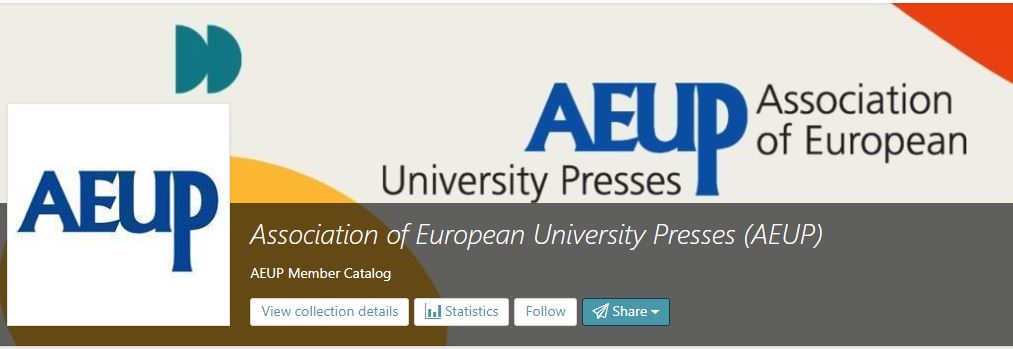AEUP has the vision to increase the visibility of our member presses and share knowledge and support for scholarly publishing. Therefore, in 2023, a new catalog service is provided to our members. AEUP has established a strategic partnership with ScienceOpen, a catalog and indexing specialist who provides automation technology and support for an attractive, up-to-date catalog embedded within a global discovery environment of over 85 million records. The catalog service is offered to every AEUP member, and the decision about participation is left to each individual press.

Features of the AEUP Catalogue
The first version of the AEUP catalog focuses on indexing books, displaying basic metadata information about the books, including alternative metrics and linking back to the individual University press’s homepage or webshop. Future updates will also include journals. The automated service is based on DOIs. ScienceOpen provides various importing routines, which can also include other import formats like Onix or other schemes. All books are presented as part of the AEUP collection on ScienceOpen. Editors of the individual presses can upgrade the basic information directly in the AEUP catalog manually.
How to get into the Catalog
As mentioned above, each AEUP member press decides individually about participation in the common AEUP collection. AEUP highly recommends using the wonderful indexing features provided through the cooperation with ScienceOpen.
The service includes:
- Basic support features for the initial setup of each member press in the common catalog. The AEUP secretary collects basic information about the metadata management of the individual press and shares it with ScienceOpen.
- ScienceOpen undertakes an initial indexing approach and directly contacts the individual press. In this process, persistent identifiers like DOIs play a crucial role. Metadata may be added via Crossref or Datacite DOIs alone or combined with ONIX feeds to ScienceOpen by FTP. Crossref DOIs ingestion can be automated. Datacite DOIs can be added manually by each participating publisher. If the metadata associated with a DOI is updated at Crossref, it will be automatically reindexed by ScienceOpen.
How to Customize Your Book Collection in the AEUP Catalog
ScienceOpen provides a Handbook for AEUP members that shows how to navigate and add supplemental information to the individual University Press book collections. You can open a profile for your press and act as an editor of your own book collection on the ScienceOpen platform.
How to Upgrade Metadata in the AEUP Catalog
The cooperation between AEUP and ScienceOpen promotes best practices in metadata generation for optimal digital discovery and offers additional services to AEUP members. AEUP and ScienceOpen have agreed that AEUP members have access to enhanced indexing services, which are either provided freely as a self-service option or negotiated directly between the individual member and ScienceOpen at reduced prices, thanks to the cooperation.
- Free Option
AEUP members who are not yet depositing DOIs for books and chapters can use the free BookMetaHub metadata management services to easily create Crossref-ready XML files. Through BookMetaHub, ScienceOpen provides a platform for publishers to create and facilitate the exchange of open book metadata. Open metadata for OA and non-OA books is critical for the transformation of the entire scholarly landscape.
- Enhanced Option
AEUP’s collaboration with ScienceOpen enables our members to present the scientific books of their authors and editors within a powerful scientific network with many up-to-date publishing services. ScienceOpen can provide further support and paid services for customers who have specific needs or projects involving book metadata. This collaboration will help AEUP members increase the digital reach of their publishing programs. Individual society member publishers can order additional metadata services, such as support with registering or updating Crossref DOIs, or members can order full open access hosting services directly with ScienceOpen.
